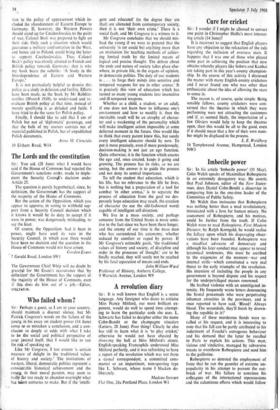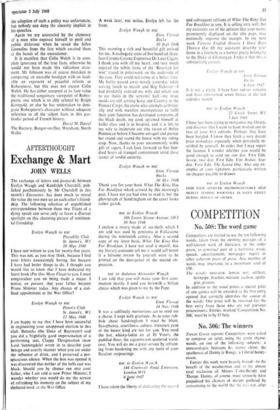Imbecile power
Sir: In his article `Imbecile power' (31 May), Cohn Welch speaks of Maximilian Robespierre in an extremely derogatory way. He asserts that Paul Johnson, editor of the New States- man, does Daniel Cohn-Bendit a disservice in comparing him to the one-time leader of the Committee of Public Safety.
Mr Welch thus insinuates that Robespierre was nothing better than a mad revolutionary, intoxicated with a love for human misery. No assessment of Robespierre, and his motives, could be further from the truth. If Colin Welch were to read Robespierre, First Modern Dictator, by Ralph Korngold, he would realise the fallacy upon which his disparaging obser- vations have been founded. Robespierre was a steadfast advocate of democracy and although his later conduct may appear to reveal tyrannical tendencies, this must be ascribed to the exigencies of the moment—war and internal strife—which constituted a very real threat to the early triumphs of the revolution. His intention of including the people in any government is beyond dispute and his respect for the underprivileged masses renowned.
He loathed violence with an unmitigated in- tensity. He frequently wrote letters denouncing the brutal proconsuls who were perpetrating inhuman atrocities in the provinces, and is once reported to have said, `Blood! Always blood. The scoundrels, they'll finish by drown- ing the republic in it!'
Many of these murderous fiends were re- called at his request, and it is interesting to note that his fall can be partly attributed to his indictment of Fouche's outrageous behaviour and his demand that the latter be recalled to Paris to explain his actions. This man, vicious and vindictive, managed by subversive means to overthrow Robespierre and send him to the guillotine.
Robespierre so detested the employment of force that he ran the gauntlet of extreme un- popularity in his attempt to prevent the out- break of war. His failure to -convince his colleagues of the international repercussions and the calamitous effects which would follow
the adoption of such a policy was unfortunate, but nobody can deny the sincerity implicit in his speeches.
Again we are astounded by the clemency of a man who exposed himself to peril and public disfavour when he saved the fallen Girondins from the fate which awaited them at the hands of the executioner.
It is manifest that Colin Welch is in com- plete ignorance of the true facts, otherwise he would not have made this ridiculous state- ment. Mr Johnson was of course mistaken in comparing an unstable hooligan with so laud- able an exponent of peaceful reform as Robespierre, but this does not excuse Colin Welch. He has either accepted at its face value the traditional sanguinary viewpoint of Robes- pierre, one which is so ably refuted by Ralph Korngold, or else he has undertaken to deni- grate Robespierre's character 'without adequate reference to all the salient facts in this par- ticular period of French history.
David M. Daniel The Rectory, Bangor-on-Dee, Wrexham, North Wales











































 Previous page
Previous page